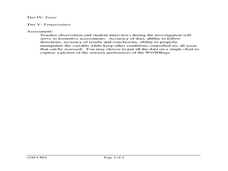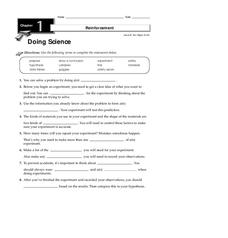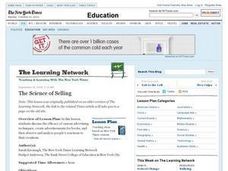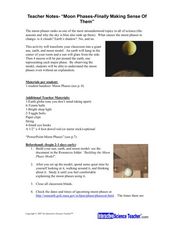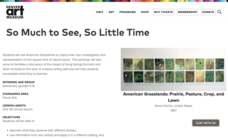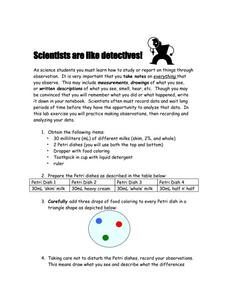Curated OER
Bubbles Galore
Students investigate bubbles. For this science lesson, students observe how long bubbles last and graph the results of the experiment.
Curated OER
Physical and Chemical Changes - Making Toffee
Fourth graders make toffee to observe both physical and chemical changes. They determine what types of changes that are caused by the cooking process and which are chemical, and which are physical. In order to do this they follow a...
Curated OER
Using the Senses as a Means of Observation
Students use their senses in various situations to determine their accuracy. In this senses lesson, students use different senses to explore common objects. They find that their senses are not always accurate.
Curated OER
Flour Beetle
Students observe the life cycle of the common flour beetle and make observations of its life stages. They also design and implement an investigation on food preference for the beetle and record data over a period of several months....
Curated OER
Chemosynthesis for the Classroom
Explorers set up Windogradsky columns with local mud so that they can culture microorganisms. After three and six weeks they make observations of the mud and the organisms growing in it. In this way they observe succession and relate...
Curated OER
Why did the can crush?
Students watch a demonstration to ascertain why a soda can crushed. They make observations and hypothesize about why a soda can crushed and relate the difference in pressure to its affect on objects around us (soda can). Explanation is...
Curated OER
The Nature of Science and Technology
Second graders perform a variety of experiments to observe, form conclusions, and make inferences. In this experiment lesson, 2nd graders experiment based on the result of a pre-assessment. Students share what they have learned.
Curated OER
Sunny Science - Sun Up, Fade Out
Students create bleached designs with the sun's bright light. In this early childhood science lesson plan, students use their observation and prediction skills as they explore the sun's bleaching power.
Curated OER
Doing Science
In this science experiment process instructional activity, students will learn about the steps of conducting a science experiment, including creating a hypothesis, collecting data and drawing a conclusion. This instructional activity has...
Curated OER
Designing a Germination Experiment
Learners explore botany by participating in a seed experiment. In this plant nutrition lesson plan, students define several science experiment vocabulary terms like observation, treatment, and replicate. Learners utilize soaked seeds in...
Curated OER
The Science of Selling
Young scholars discuss advertisements and techniques they have discovered. They read an article about the science of selling and create an advertisement of their own to sell a book. They record people's reactions to their advertisement...
Curated OER
Science Workshops
Based on the popular Writer's Workshops used in language arts, Science Workshops can be used to teach both science content and process.
Curated OER
Moon Phases - Finally Making Sense of Them
Students investigate the different phases of the moon. In this lunar cycle lesson, students create models of the sun, earth and moon and investigate why we observe the moon the way we do. Students observe a PowerPoint...
Curated OER
Make Your Own Compass
Students explore magnetism. In this "magnets" science instructional activity, students make a compass with common household items and explain the relationship between what a compass does and the earth's magnetic fields.
Curated OER
The Dose Makes The Poison
Students observe beakers of water that contain different amounts of a mystery chemical. They discuss how each amount of the chemical might affect them if the chemical was beneficial or harmful to their bodies.
Curated OER
Science Current Events Lessons
You can use current events to increase student understanding of both science concepts and language arts skills.
Curated OER
How Do You Make A Tornado?
Students create a tornado in a bottle. In this climate and weather lesson, students review basic information about tornadoes and thunderstorms. Students make a tornado in a bottle and write about what they learned from the project....
Curated OER
The Scientific Method
If the steps that you follow for the scientific method are as follows, this presentation can be useful: observation, question, hypothesis, method, result. Unfortunately, not every scientist or teacher uses the same terminology, The...
Curated OER
One Sweet Experiment
This resource is designed to be used as a lab sheet when experimenting with the dissolution of sugar in water. It's very nice in that it follows the scientific method of experimentation. There are places for the definition of the...
Curated OER
States Of Matter
Delv into the states of Matter. Students engage in the scientific inquiry process to uncover the exciting world of Matter. They watch a series of videos, and conduct experiments in order to collect and analyze data on the various state...
PBS
NOVA Sun Lab Lesson Plan
Looking for a sun-sational multi-lesson plan full of videos, simulations, and discussion? Introduce your young scientists to all things solar with a four-part hands-on adventure. Pupils learn the basics of solar anatomy, space weather,...
Denver Art Museum
So Much to See, So Little Time
How do humans and animals impact the environment? What is land division? Youngsters tape off a 12x12 inch square in an outdoor natural space. They sketch everything they see, then compare their drawings as a class. They will then be...
Royal Society of Chemistry
Acids and Bases—Microscale Chemistry
Here's proof that small-scale labs lead to big-time learning. Introduce acid-base interactions to middle school scientists through a microscale chemistry lab. Pupils combine a variety of solutions and use indicators to obtain approximate...
Curated OER
Scientist Are Like Detectives
Students demonstrate proper scientific observation skills. For this investigative science lesson, students make observations, record their findings and form conclusions in order to improve their scientific documentation and writing skills.








